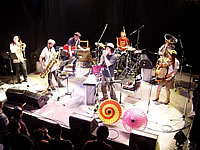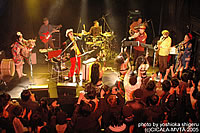Cicala Mvta (JAPAN)
 Click
here to listen to sound samples and the online shopping page for this
artist
Click
here to listen to sound samples and the online shopping page for this
artist
Generally available, now booking 2010/11
Albums The Return of Japanese Street Music and Deko Boko (Tropical, Germany)
Line Up
Wataru Ohkuma (clarinet)
Yoshiyuki Kawaguchi (sax)
Yoshiki Sakurai (guitars)
Yoshiaki Sato (accordion)
Akiko Watanabe (trombone)
Takero Sekijima (tuba)
Tatsuya Yoshida (drums)
Miwazo Kogure (chindon daiko and goros drum)
 The
name 'Cicala Mvta' (pronounced Shikala Moota, Italian for a mute cicada)
is a tribute to Soeda Azembo, the greatest street singer and songwriter
of popular music in Japan, who was reduced to silence by the authorities
after the 1920s. Led by clarinetist Wataru Ohkuma, one of the most innovative
musicians in Japan today, Cicala Mvta are heirs to Soeda Azembo and have
taken over the fight against the Japanese establishment. They develop
music drawn from from chindon (street advertising music, the commercial
medium before the advent of TV) and it's predecessor, Jinta (original
Japanese brass band music, a form for anti-establishment expression).
A mixture of old and new, east and west their music borrows openly from
Klezmer, Turkish, Nepalese and Balkan music, progressive rock, punk, free
jazz and folk to create it's own world. Colorful chindon groups used to
be a common sight in Japan, marching in the streets noisily banging a
chindon drum, while saxophones or clarinets would pick out the melody
to the hits of the day.Ohkuma tramped the streets of Tokyo for 7 years
playing clarinet as part of a spluttering tradition, until the late 80s
when together with the group Compostella he started to revive chindon
music by mixing it with other elements. While Japan is the only eastern
country to have so readily absorbed western music, street performances
of wind and percussion instruments can be found all over the world. As
an "unmilitarized" street music, chindon is related to Jewish Klezmer
music, New Orleans brass bands and wind and percussion ensembles from
China and south east Asia. Ohkuma is as keen to embrace these influences
in the music of Cicala Mvta. "In my opinion, old jazz , klezmer or wedding
brass band traditions, from India to the Balkans, are all similar to chindon
as an early modern mixture music . These are all clarinet musics, so it's
very natural for me to play these types together" he says. Ohkuma's other
disparate influences help give Cicala Mvta their own distinctive sound.
These he cites as progressive rock, punk, avant-garde jazz, early modern
music (such as Bartok) and folk. Only occasionally featuring the chindon
drum, Ohkuma's perky clarinet is ably abetted by an unusual line-up of
musicians, each bringing with them a sense of individuality to supplement
Ohkuma's clarinet and saxophone, in what is a totally original line-up;
fluid, distorted electric guitar, rip-roaring, booming tuba, frantic,
discordant fiddle, and tinny, shuffling drums.
The
name 'Cicala Mvta' (pronounced Shikala Moota, Italian for a mute cicada)
is a tribute to Soeda Azembo, the greatest street singer and songwriter
of popular music in Japan, who was reduced to silence by the authorities
after the 1920s. Led by clarinetist Wataru Ohkuma, one of the most innovative
musicians in Japan today, Cicala Mvta are heirs to Soeda Azembo and have
taken over the fight against the Japanese establishment. They develop
music drawn from from chindon (street advertising music, the commercial
medium before the advent of TV) and it's predecessor, Jinta (original
Japanese brass band music, a form for anti-establishment expression).
A mixture of old and new, east and west their music borrows openly from
Klezmer, Turkish, Nepalese and Balkan music, progressive rock, punk, free
jazz and folk to create it's own world. Colorful chindon groups used to
be a common sight in Japan, marching in the streets noisily banging a
chindon drum, while saxophones or clarinets would pick out the melody
to the hits of the day.Ohkuma tramped the streets of Tokyo for 7 years
playing clarinet as part of a spluttering tradition, until the late 80s
when together with the group Compostella he started to revive chindon
music by mixing it with other elements. While Japan is the only eastern
country to have so readily absorbed western music, street performances
of wind and percussion instruments can be found all over the world. As
an "unmilitarized" street music, chindon is related to Jewish Klezmer
music, New Orleans brass bands and wind and percussion ensembles from
China and south east Asia. Ohkuma is as keen to embrace these influences
in the music of Cicala Mvta. "In my opinion, old jazz , klezmer or wedding
brass band traditions, from India to the Balkans, are all similar to chindon
as an early modern mixture music . These are all clarinet musics, so it's
very natural for me to play these types together" he says. Ohkuma's other
disparate influences help give Cicala Mvta their own distinctive sound.
These he cites as progressive rock, punk, avant-garde jazz, early modern
music (such as Bartok) and folk. Only occasionally featuring the chindon
drum, Ohkuma's perky clarinet is ably abetted by an unusual line-up of
musicians, each bringing with them a sense of individuality to supplement
Ohkuma's clarinet and saxophone, in what is a totally original line-up;
fluid, distorted electric guitar, rip-roaring, booming tuba, frantic,
discordant fiddle, and tinny, shuffling drums.
 Cicala
Mvta are a truly dynamic live act, one of a handful of Japanese groups,
to have created a 'buzz' in other countries. Their first overseas gig
in 2000 was supporting Blur in London, afterwhich they toured for 6 weeks,
playing to enthusiastic audiences at festivals throughout Europe. They
have since been back to Europe several times.
Cicala
Mvta are a truly dynamic live act, one of a handful of Japanese groups,
to have created a 'buzz' in other countries. Their first overseas gig
in 2000 was supporting Blur in London, afterwhich they toured for 6 weeks,
playing to enthusiastic audiences at festivals throughout Europe. They
have since been back to Europe several times.